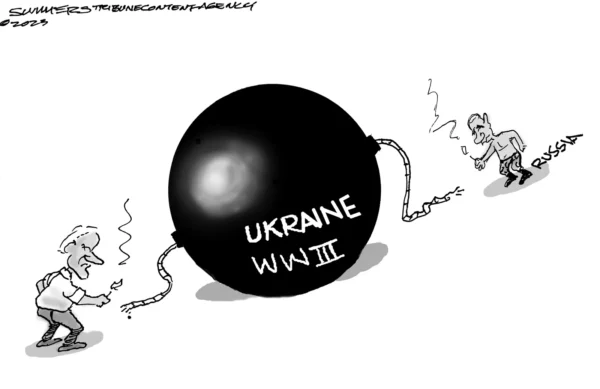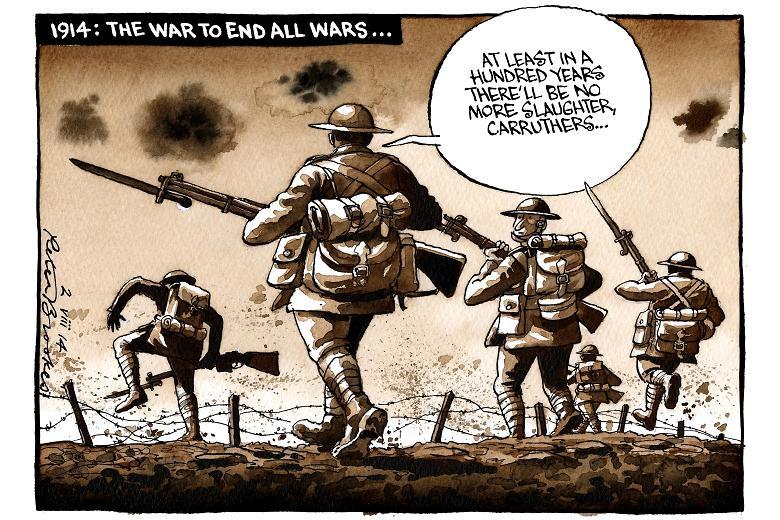
President Joe Biden seems hellbent on stoking the flames of war, both in Ukraine/Russia and Palestine before he leaves office. It is hard not to conclude that Biden is a warmonger — one who urges or attempts to stir up war. Instead of trying to broker peace between Ukraine and Russia, Biden stokes the war by giving Ukraine increasingly sophisticated offensive weapons. U.S. armaments have slaughtered countless Russian soldiers — many of whom are conscripts. Recently, Biden permitted Ukraine to use U.S.-provided missiles in Russia. Russia’s response was to shoot a new kind of ICBM missile armed with a conventional warhead into Ukraine. These missiles could be armed with nuclear warheads.
Anti-personnel land mines are indiscriminate weapons that kill and maim civilians, and especially children, for generations after wars end. These weapons cannot distinguish between civilians and combatants as required by international humanitarian law.
Hichem Khadhraoui, executive director of the Center for Civilians in Conflict
In 2022, Biden released the following statement about changes in U.S. policy on anti-personnel landmines:
Today, the Biden-Harris Administration is announcing important policy changes to U.S. Anti-Personnel Landmine policy. After conducting a comprehensive policy review, the United States is joining the vast majority of countries around the world in committing to limit the use of anti-personnel landmines (APL).These changes reflect the President’s belief that these weapons have disproportionate impact on civilians, including children, long after fighting has stopped, and that we need to curtail the use of APL worldwide. They also complement longstanding U.S. leadership in the clearance of landmines and other explosive remnants of war.
The new commitment announced today will align U.S. APL policy outside of the Korean Peninsula with the key requirements of the Ottawa Convention – the international treaty prohibiting the use, stockpiling, production, and transfer of APL – which has more than 160 parties, including all of our NATO Allies. This means that the United States will:
- Not develop, produce, or acquire APL;
- Not export or transfer of APL, except when necessary for activities related to mine detection or removal, and for the purpose of destruction;
- Not use APL outside of the Korean Peninsula;
- Not assist, encourage, or induce anyone, outside of the context of the Korean Peninsula, to engage in any activity that would be prohibited by the Ottawa Convention; and
- Undertake to destroy all APL stockpiles not required for the defense of the Republic of Korea.
Additionally, the United States will undertake diligent efforts to pursue materiel and operational solutions to assist in becoming compliant with and ultimately acceding to the Ottawa Convention, while ensuring our ability to respond to contingencies and meet our alliance commitments.
The new policy announced today represents a further step to advance the humanitarian aims of the Ottawa Convention, and to bring U.S. practice in closer alignment with a global humanitarian movement that has had a demonstrated positive impact in reducing civilian casualties from APL.
Even as the United States takes this further step, the unique circumstances on the Korean Peninsula and the U.S. commitment to the defense of the Republic of Korea preclude the United States from changing anti-personnel landmine policy on the Korean Peninsula at this time. As the United States commits to continuing our diligent efforts to pursue material and operational alternatives to APL, the security of our ally the Republic of Korea will continue to be a paramount concern.
World Leader in Humanitarian Mine Action
The United States is the world’s single largest financial supporter of steps to mitigate the harmful consequences of landmines and explosive remnants of war around the world, including through land clearance and medical rehabilitation and vocational training for those injured by these weapons. Since the United States Humanitarian Mine Action Program was established in 1993, the United States has provided over $4.2 billion in aid in over 100 countries for conventional weapons destruction programs. Through this assistance, the United States has:
- Helped 17 countries become free from the danger of landmines;
- Provided assistive devices and other rehabilitation services to over 250,000 people in 35 countries through the U.S. Agency for International Development-managed Leahy War Victims Fund.
This vital U.S. assistance has helped post-conflict countries consolidate peace and set the stage for reconstruction and development. Clearance efforts and victim assistance programs return land and infrastructure to productive use and assist in the rehabilitation and reintegration into society of survivors of mine and explosive remnants of war incidents.
— end of statement
This statement is little more than the Biden Administration’s attempt to gaslight the American people; presenting the United States as being aligned with 160 other nations in banning anti-personnel mine use. Of course, the U.S. is NOT a signatory to the Ottawa Convention! Biden wants to tell the rest of the world what to do, but reserves the right to use anti-personnel mines.
Ukraine is a signatory of the Ottawa Convention. Explain to me, then, Biden casting aside what he said in 2022 and sending anti-personnel mines to Ukraine to use in their war against Russia. Explain to me, then, Ukraine’s use of these mines in direct contravention of the Convention they signed in 2022.
Human rights groups are fiercely criticizing President Joe Biden’s decision to give Ukraine anti-personnel land mines as it fights off a Russian invasion.
The decision reverses a pledge Biden made to limit the use of such land mines in 2022. It comes as Biden prepares to leave office and reflects mounting U.S. concerns over Russia’s battlefield gains in eastern Ukraine.
But although the type of land mine the Biden team is handing to Ukraine has certain safeguards, rights groups nonetheless warned that the weapons pose special and long-term dangers.
“Anti-personnel land mines are indiscriminate weapons that kill and maim civilians, and especially children, for generations after wars end,” said Hichem Khadhraoui, executive director of the Center for Civilians in Conflict advocacy group. “These weapons cannot distinguish between civilians and combatants as required by international humanitarian law.”
Ben Linden, a top official with Amnesty International USA, said, “It is devastating, and frankly shocking, that President Biden made such a consequential and dangerous decision just before his public service legacy is sealed for the history books.”
The Biden administration defended the move on multiple grounds. It noted that the types of mines it is providing are “non-persistent,” meaning they become inert after a time.
“They are electrically fused and require battery power to detonate. Once the battery runs out, they will not detonate,” said a U.S. official, who was granted anonymity to candidly explain the administration’s choice.
The Biden administration in July 2023 began to supply Ukraine with cluster munitions that had been held in large numbers in U.S. military stockpiles since the end of the Cold War, but which the United States had previously been barred from sending. But it held off on sending anti-personnel land mines, such as the ones it is sending now, which can be effective in stopping massed infantry assaults that Ukraine is likely to face from thousands of North Korean troops that have arrived in the Kursk region of Russia, but can be left on the battlefield for generations, potentially long after the conflict is over.
More than 50,000 square miles of Ukraine needs to be searched for land mines and explosives, according to Ukrainian government estimates, an area larger than England.
Biden in 2022 issued a new policy to bar the U.S. use or transfer of anti-personnel mines outside of the Korean peninsula. This came after then-President Donald Trump in 2020 undid Obama-era restrictions on U.S. land mine uses.
The latest decision underscores growing unease within the Biden administration over the desperate battlefield situation as Russia makes slow and costly but incremental gains against Kyiv’s forces in eastern Ukraine.
The land mine decision follows another Biden reversal: He recently agreed to let Ukraine use American-supplied long-range missiles for strikes deep inside Russia following months of pressure from Ukraine and its strongest supporters in the West.
In providing the mines, Biden said to Ukraine President Volodymyr Zelenskyy, “Hey Volod. How ya doing, buddy? Hunter says, Hi! Please don’t use these in Russia or Ukrainian civilian areas. Promise, pinky swear?” Zelenskyy replied, with fingers crossed behind his back, “I promise, Uncle Joe.”
Here’s what I know about war. Nations start with high ideals, promising to adhere to international law such as the Geneva Conventions and making appeals to just war theory. The longer wars go on and political and military leaders become more desperate for victory, international law falls by the wayside and warring nations use any and every means to win — including dropping atomic bombs on Japanese civilians in Nagasaki and Hiroshima, firebombing citizens in Dresden and Tokyo, and dropping napalm on helpless Vietnamese.
The United States has a long, continuous history of military intervention, violence, and bloodshed. Biden’s actions are unsurprising. He is just another president in a long line of presidents who think war begets peace. This is a delusional lie; one that warmongers use to convince themselves that they are good people.
Bruce Gerencser, 68, lives in rural Northwest Ohio with his wife of 47 years. He and his wife have six grown children and sixteen grandchildren. Bruce pastored Evangelical churches for twenty-five years in Ohio, Texas, and Michigan. Bruce left the ministry in 2005, and in 2008 he left Christianity. Bruce is now a humanist and an atheist.
Your comments are welcome and appreciated. All first-time comments are moderated. Please read the commenting rules before commenting.
You can email Bruce via the Contact Form.










